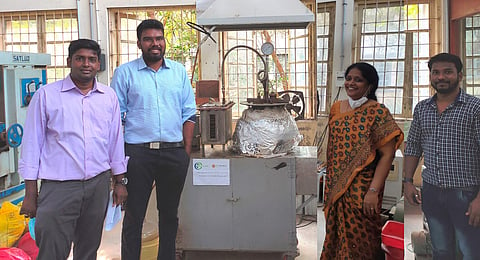

Plastic waste is a serious problem in India. According to the Central Pollution Control Board, a total of 3.3 million metric tonnes of plastic waste is generated every year. The Centre for Science and Environment states that India's plastic waste generation is growing at an alarming rate every year. As such, it is impertinent that a method should be developed to either recycle these large quantities of plastic waste or at least dispose of them in an eco-friendly manner. It was with this intention that a team of women scientists from IIT Madras, all professors, post-docs or research scholars, which included civil engineering professor Indumathi M Nambi, participated in the Carbon Zero Challenge in 2017 to pitch their business idea related to controlling plastic waste. Soon after, they founded Samudhyoga Waste Chakra, which is now incubated at the institute's incubation cell and is using a patent-pending technology of decentralised, solar-powered pyrolysis to tackle up to 250 kg of plastic daily.
Today, Samudhyoga Waste Chakra is run by several post-doc researchers and PhD students of IIT Madras with Sriram Narasimhan as the Director. "The pyrolysis device has been optimised for the last two years to ensure that maximum amount of plastic waste can be processed at any given point of time," says Sriram. "We have used various types of plastics — from FMCG, municipal waste and biomedical waste — and even realised that the device can also process PPE kits, the disposal of which is now of paramount importance," he adds.
So how does the machine work? "The waste plastic, in the presence of catalysts, is heated up to a temperature of 400°C. The plastic breaks down and is finally converted into usable furnace oil, a hydrocarbon liquid with a lot of energy, equivalent to diesel," explains Sriram.
If it's scaled up, Sriram says, it can necessarily be operated simultaneously at different locations for different types of plastics to ensure that it generates optimal output of the diesel-like oil. "The first unit will soon be installed at one of the Greater Chennai Corporation's locations. We are also in talks with corporations of Mumbai and Pune for installing this unit in multiple locations," says Sriram. Since the machine can be installed in multiple locations, this can significant reduce building and transportation cost too, explains Sriram.
